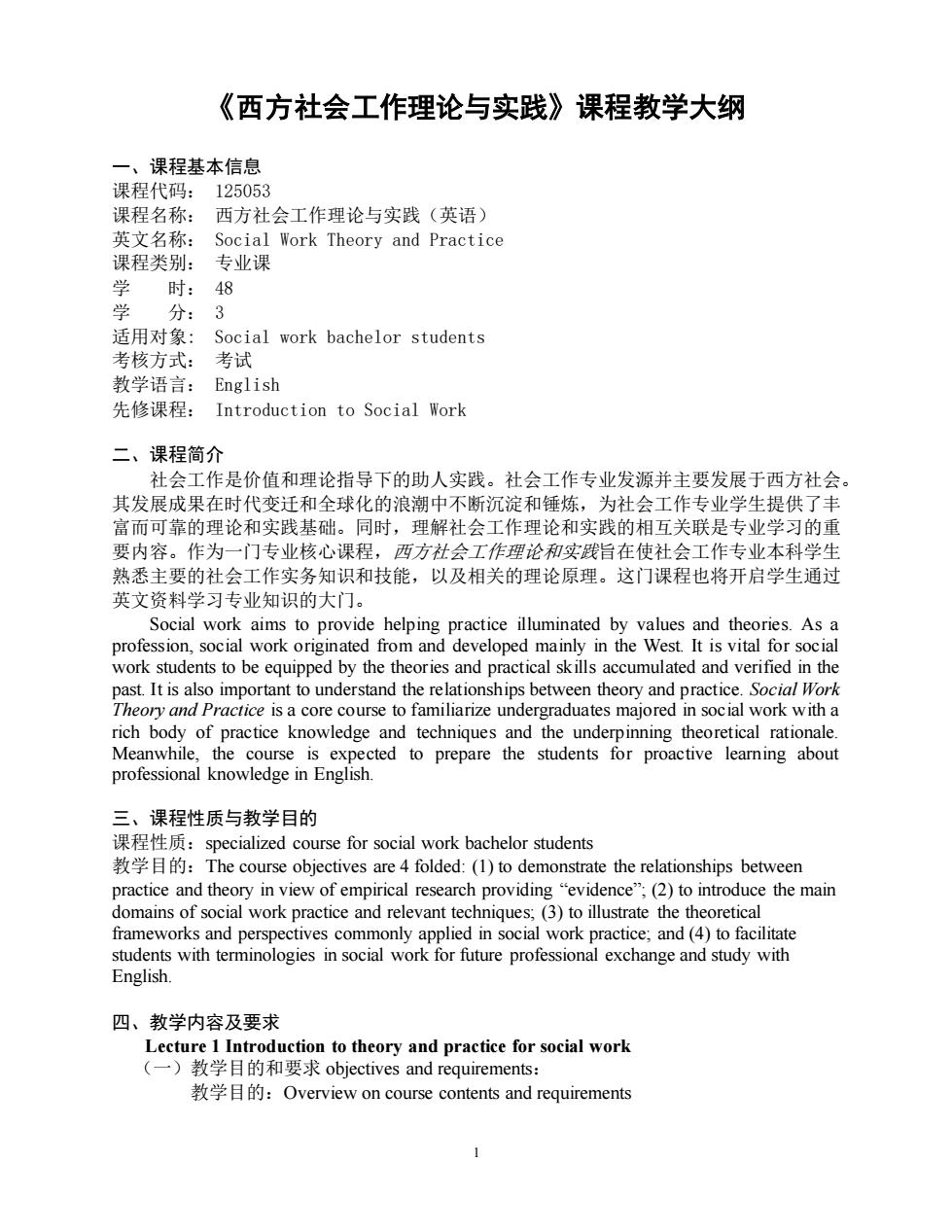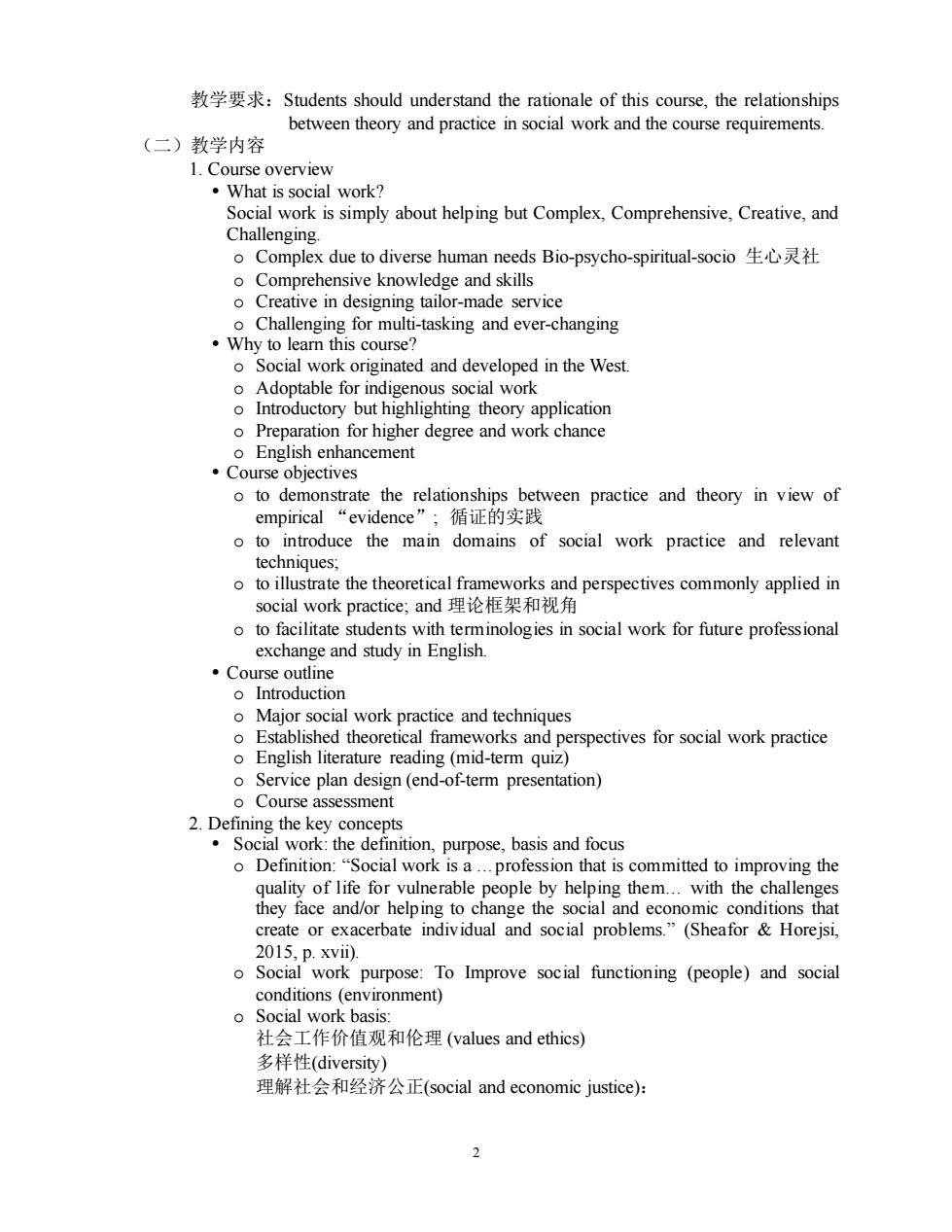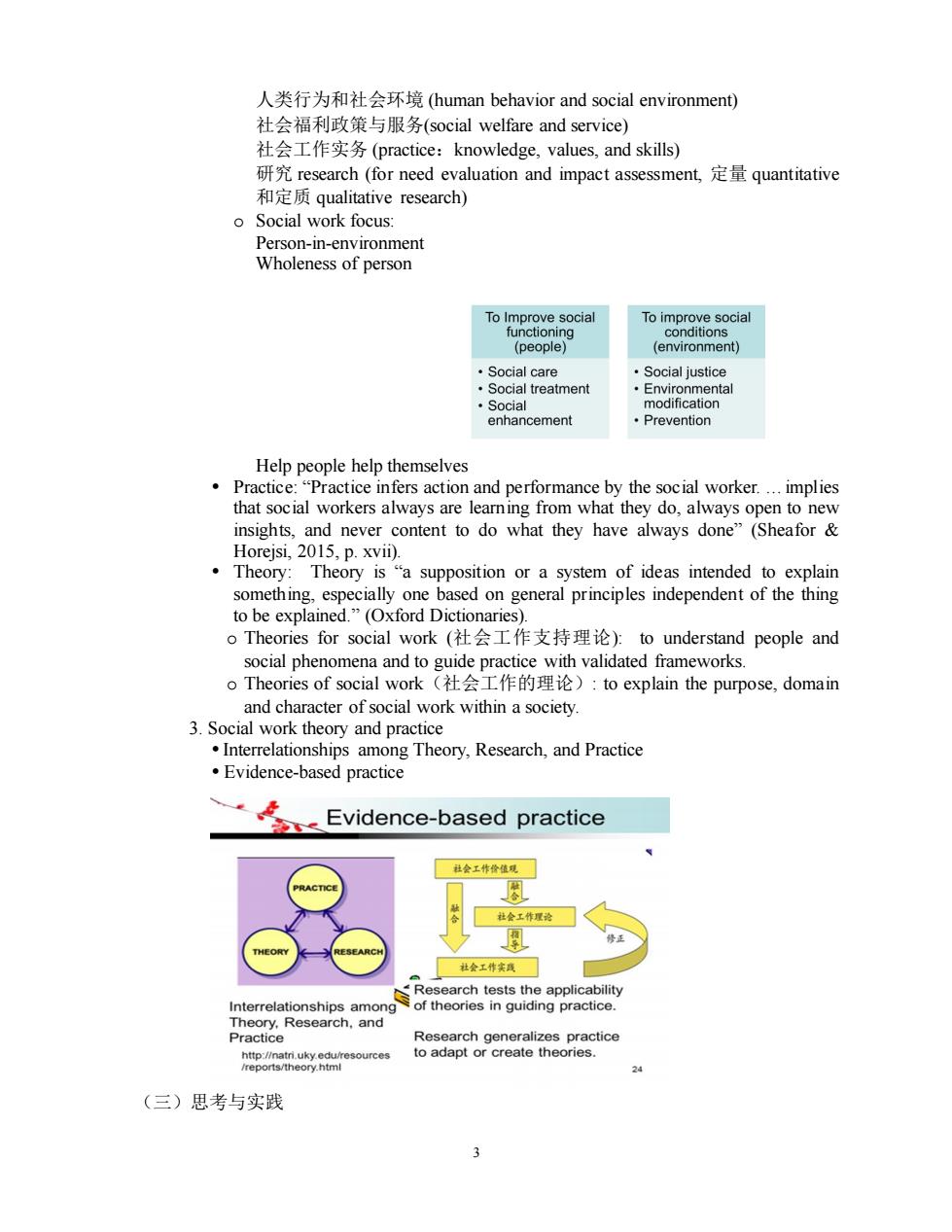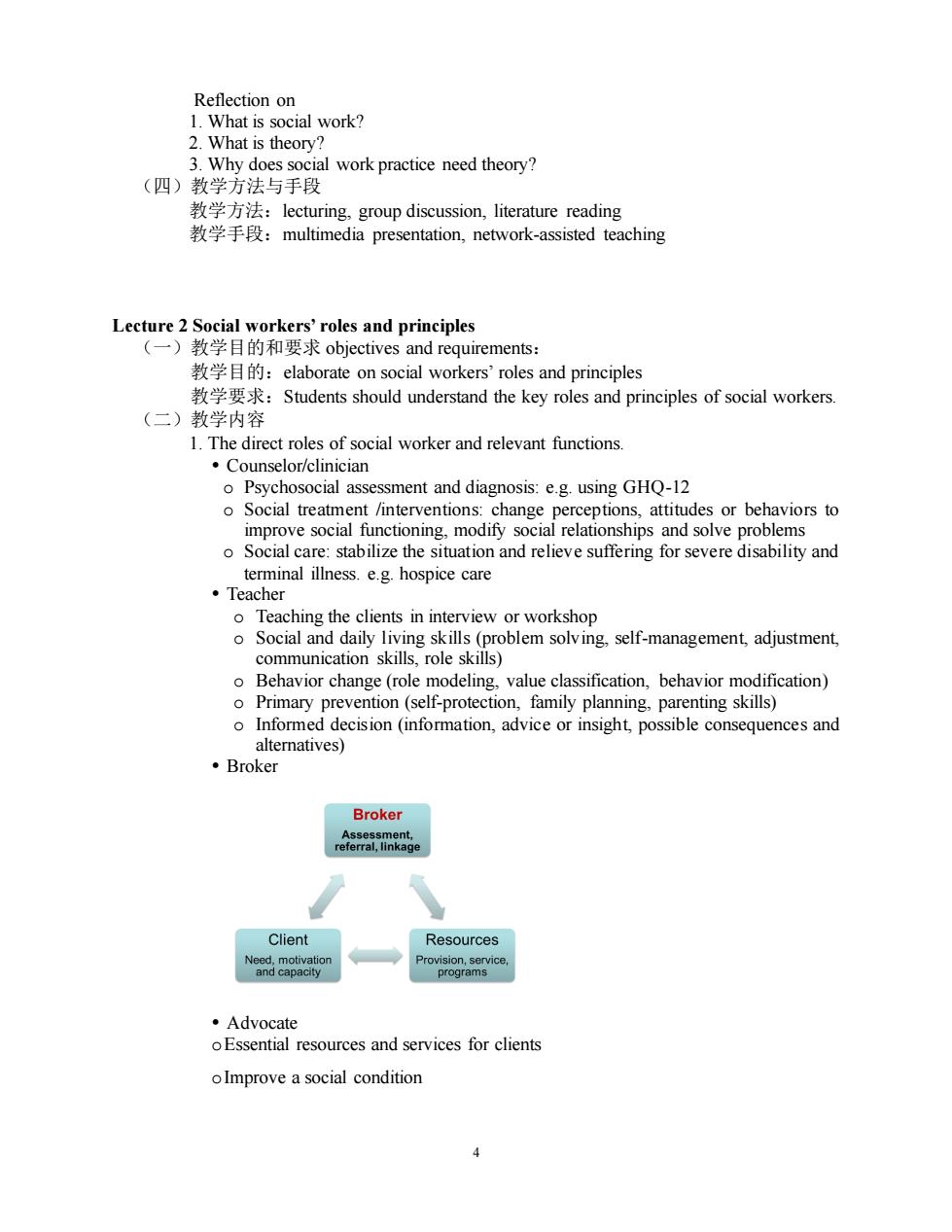
《西方社会工作理论与实践》课程教学大纲 一、课程基本信息 课程代码:125053 课程名称:西方社会工作理论与实践(英语)》 英文名称:Social Work Theory and Practice 课程类别:专业课 学时:48 分: 适用对象:Social work bachelor students 考核方式:考试 教学语言:English 先修课程:Introduction to Social Work 二、课程简介 社会工作是价值和理论指导下的助人实践。社会工作专业发源并主要发展于西方社会 其发展成果在时代变迁和全球化的浪潮中不断沉淀和锤炼,为社会工作专业学生提供了丰 富而可靠的理论和实践基础。 司时,理解社会工作理论和实践的相互 关联是专业学 习的重 要内容。作为一门专业核心课程,西方社会工作理论和实践指在使社会工作专业本科学生 熟悉主要的社会工作实务知识和技能,以及相关的理论原理。这门课程也将开启学生通过 英文资料学习专业知识的大门。 Social and theo As ped ts to y the nt to understa eret and in the orie ted bet een theory an Social Wor grad ored 000 practice xpeced to prepare the studentsfor proactive eaming retical rati 三、课程性质与教学目的 课程性质:specialized course for social work bachelor students 教学目的:The course objectives are4 folded:(l)to demonstrate the relationships between practice and theory in view of empirical research providing "evidence":(2)to introduce the main domains of social work practice and relevant techniques:(3)to illustrate the theoretical frameworks and p erspectives commonly applied in social work practice:and(4)to facilitate students with terminologies in social work for future professional exchange and study with English. 四、教学内容及要求 Lecture I Introduction to theory and practice for social work (一)教学目的和要求objectives and requirements: 教学目的:Overview on course contents and requirements 1
1 《西方社会工作理论与实践》课程教学大纲 一、课程基本信息 课程代码: 125053 课程名称: 西方社会工作理论与实践(英语) 英文名称: Social Work Theory and Practice 课程类别: 专业课 学 时: 48 学 分: 3 适用对象: Social work bachelor students 考核方式: 考试 教学语言: English 先修课程: Introduction to Social Work 二、课程简介 社会工作是价值和理论指导下的助人实践。社会工作专业发源并主要发展于西方社会。 其发展成果在时代变迁和全球化的浪潮中不断沉淀和锤炼,为社会工作专业学生提供了丰 富而可靠的理论和实践基础。同时,理解社会工作理论和实践的相互关联是专业学习的重 要内容。作为一门专业核心课程,西方社会工作理论和实践旨在使社会工作专业本科学生 熟悉主要的社会工作实务知识和技能,以及相关的理论原理。这门课程也将开启学生通过 英文资料学习专业知识的大门。 Social work aims to provide helping practice illuminated by values and theories. As a profession, social work originated from and developed mainly in the West. It is vital for social work students to be equipped by the theories and practical skills accumulated and verified in the past. It is also important to understand the relationships between theory and practice. Social Work Theory and Practice is a core course to familiarize undergraduates majored in social work with a rich body of practice knowledge and techniques and the underpinning theoretical rationale. Meanwhile, the course is expected to prepare the students for proactive learning about professional knowledge in English. 三、课程性质与教学目的 课程性质:specialized course for social work bachelor students 教学目的:The course objectives are 4 folded: (1) to demonstrate the relationships between practice and theory in view of empirical research providing “evidence”; (2) to introduce the main domains of social work practice and relevant techniques; (3) to illustrate the theoretical frameworks and perspectives commonly applied in social work practice; and (4) to facilitate students with terminologies in social work for future professional exchange and study with English. 四、教学内容及要求 Lecture 1 Introduction to theory and practice for social work (一)教学目的和要求 objectives and requirements: 教学目的:Overview on course contents and requirements

教学要求:Students should understand the rationale of this course,.the relationships between theory and practice in social work and the course requirements. (二)教学内容 1.Course overview ·What is social work? Social work is simply about helping but Complex,Comprehensive,Creative,and Challenging mplex due to diverse human needs Bio-psycho-.-spirital--socio生心灵t社 o Compreh e knowle ge and skills Creative n esigning tair-made service o Challenging for multi-tasking and ever-changing Why to learn this course? o Social work originated and developed in the West. o Adoptable for indigenous social work o Introductory but highlighting theory application o Preparation for higher degree and work chance o English enhancement ·Course objectives o to demonstrate the relationships between practice and theory in view of :循证的实践 ntroduce the main domains of soctal work practice and relevant niques oto illustrate the theoretical frameworks and perspectives commonly applied in social work practice,and理论框架和视角 o to facilitate students with terminologies in social work for future professional exchange and study in English. ·Course outline o Introduction o Major social work practice and techniques o Established theoretical fra orks and (mid-term erspectives for social work practice English literature readin n(end -of-term presentation) 20 ition,purpose,basis and foc ocial work is a.profession that is committed to improving the quality of life for vulnerable people by helping them...with the challenges they face and/or helping to change the social and economic conditions that create or exacerbate individual and social problems."(Sheafor Horejsi, 2015,p.xvii). oSocial work purpose:To Improve social functioning (people)and social conditions(environment) o Social work basis: 社会工作价值观和伦理(values and ethics) 多样性(di ersity) 理解社会和经济公正(social and economic justice):
2 教学要求:Students should understand the rationale of this course, the relationships between theory and practice in social work and the course requirements. (二)教学内容 1. Course overview What is social work? Social work is simply about helping but Complex, Comprehensive, Creative, and Challenging. o Complex due to diverse human needs Bio-psycho-spiritual-socio 生心灵社 o Comprehensive knowledge and skills o Creative in designing tailor-made service o Challenging for multi-tasking and ever-changing Why to learn this course? o Social work originated and developed in the West. o Adoptable for indigenous social work o Introductory but highlighting theory application o Preparation for higher degree and work chance o English enhancement Course objectives o to demonstrate the relationships between practice and theory in view of empirical “evidence”; 循证的实践 o to introduce the main domains of social work practice and relevant techniques; o to illustrate the theoretical frameworks and perspectives commonly applied in social work practice; and 理论框架和视角 o to facilitate students with terminologies in social work for future professional exchange and study in English. Course outline o Introduction o Major social work practice and techniques o Established theoretical frameworks and perspectives for social work practice o English literature reading (mid-term quiz) o Service plan design (end-of-term presentation) o Course assessment 2. Defining the key concepts Social work: the definition, purpose, basis and focus o Definition: “Social work is a …profession that is committed to improving the quality of life for vulnerable people by helping them… with the challenges they face and/or helping to change the social and economic conditions that create or exacerbate individual and social problems.” (Sheafor & Horejsi, 2015, p. xvii). o Social work purpose: To Improve social functioning (people) and social conditions (environment) o Social work basis: 社会工作价值观和伦理 (values and ethics) 多样性(diversity) 理解社会和经济公正(social and economic justice):

人类行为和社会环境(human behavior and social environment) 社会福利政策与服务(social welfare and service) 社会工作实务(practice:knowledge,.values,.and skills) a研究research(for need evaluation and impact assessment,.定量quantitative 和定质qualitative research) oSocial work focus: Wholeness of person To l social To i social nment) ocalgaro Social just Help people help themselves Practice I worker. ...implies insights,and never content to do what they have always done"(Sheafor Horejsi,2015,p.xvii). .Theory:Theory is "a supposition or a system of ideas intended to explain something,especially one based on general principles independent of the thing to be explained."(Oxford Dictionaries). o Theories for social work(社会工作支持理论)to understand people and social phenomena and to guide actice with validated frameworks 。Theories of i work社会作的理论):,.domain and character of social work within a society. 3.Social work theory and practice Interrelationships among Theory,Research,and Practice .Evidence-based practice Evidence-based practice np"mnyoourc (三)思考与实践
3 人类行为和社会环境 (human behavior and social environment) 社会福利政策与服务(social welfare and service) 社会工作实务 (practice:knowledge, values, and skills) 研究 research (for need evaluation and impact assessment, 定量 quantitative 和定质 qualitative research) o Social work focus: Person-in-environment Wholeness of person Help people help themselves Practice: “Practice infers action and performance by the social worker. …implies that social workers always are learning from what they do, always open to new insights, and never content to do what they have always done” (Sheafor & Horejsi, 2015, p. xvii). Theory: Theory is “a supposition or a system of ideas intended to explain something, especially one based on general principles independent of the thing to be explained.” (Oxford Dictionaries). o Theories for social work (社会工作支持理论): to understand people and social phenomena and to guide practice with validated frameworks. o Theories of social work(社会工作的理论): to explain the purpose, domain and character of social work within a society. 3. Social work theory and practice Interrelationships among Theory, Research, and Practice Evidence-based practice (三)思考与实践

Reflection on 1.What iss 2 What cial work? theory Why d work practice need theory? (四)教学方法与手段 教学方法:lecturing,group discussion,literature reading 教学手段:multimedia presentation,network-assisted teaching Lecture 2 Social workers'roles and principles (一)教学目的和要求objectives and requirements: 教学目的:elaborate on social workersroles and principles 教学要求:Students should understand the key roles and principles of social workers. (二)教学内容 1.The direct roles of social worker and relevant functions. Cou ment and diagnosis:e.g.using GHQ-12 Social treatr di or behaviors to prot re:stabilize the situation and relieve suffering for severe disability and terminal illness.e.g.hospice care .Teacher o Teaching the clients in interview or workshop o Social and daily living skills(problem solving,self-management,adjustment, communication skills.role skills) o Behavior change(role modeling,value classification,behavior modification) o Primary prevention(self-protection,family planning,parenting skills) o Informed decision (information.advice or insight.possible consequences and alternatives) ·Broker Broker Client Resources ·Advocate oEssential resources and services for clients oImprove a social condition
4 Reflection on 1. What is social work? 2. What is theory? 3. Why does social work practice need theory? (四)教学方法与手段 教学方法:lecturing, group discussion, literature reading 教学手段:multimedia presentation, network-assisted teaching Lecture 2 Social workers’ roles and principles (一)教学目的和要求 objectives and requirements: 教学目的:elaborate on social workers’ roles and principles 教学要求:Students should understand the key roles and principles of social workers. (二)教学内容 1. The direct roles of social worker and relevant functions. Counselor/clinician o Psychosocial assessment and diagnosis: e.g. using GHQ-12 o Social treatment /interventions: change perceptions, attitudes or behaviors to improve social functioning, modify social relationships and solve problems o Social care: stabilize the situation and relieve suffering for severe disability and terminal illness. e.g. hospice care Teacher o Teaching the clients in interview or workshop o Social and daily living skills (problem solving, self-management, adjustment, communication skills, role skills) o Behavior change (role modeling, value classification, behavior modification) o Primary prevention (self-protection, family planning, parenting skills) o Informed decision (information, advice or insight, possible consequences and alternatives) Broker Advocate oEssential resources and services for clients oImprove a social condition

oPrevent a social problem oClients to be their own advocates ·Case manager dentificatior Planning Follow-up Support Coordination 2.The indirect roles of social worker and relevant functions. .Work load manager:Work planning,Time management,Quality review, Information processing per:Orientation and training,Personnel management. nagement,Intemal and external coordination,Policy and agent:Social problem or policy analysis,Mobilization of community concern,S ocial resource Researcher/evaluator:Evaluate existing knowledge /theory.Practice evaluation. Research for Professional:Self-assessment,Personal/professional development,Contribution to the profession and knowledge 3.The principles for social worker Practice social work (social function and conditions) Use consciously of self(passion,commitment,personality,capacity,skill,value, belief,behavior,etc.) Maintain professional objectivity (controlled emotional involvement) Embrace human diversity (sensitivity and no stereotypes) .Adopt people-first thinking(personhood before symptoms) Challenge social injustices .Enhance professional competence(know more and keep updated) ork tice m(m m ethical method,beh -ha pract dence from web resources olle etc.) relev value and ethic (right vs.wr ong) Address all relevant client systems (whole person.SWOT.environment) Serve the most vulnerable
5 oPrevent a social problem oClients to be their own advocates Case manager 2. The indirect roles of social worker and relevant functions. Work load manager: Work planning, Time management, Quality review, Information processing, Supervisor/staff developer: Orientation and training, Personnel management, Supervision, Consultation Administrator: Management, Internal and external coordination, Policy and program development Social change agent: Social problem or policy analysis, Mobilization of community concern, Social resource development Researcher/evaluator: Evaluate existing knowledge / theory, Practice evaluation, Research for development Professional: Self-assessment, Personal/ professional development, Contribution to the profession and knowledge 3. The principles for social worker Practice social work (social function and conditions) Use consciously of self (passion, commitment, personality, capacity, skill, value, belief, behavior, etc.) Maintain professional objectivity (controlled emotional involvement) Embrace human diversity (sensitivity and no stereotypes) Adopt people-first thinking (personhood before symptoms) Challenge social injustices Enhance professional competence (know more and keep updated) 4. The principles for social work practice Do no harm (minimize mistakes in ethical, method, behavior, etc.) Engage in evidence-based practice (evidence from literature, web resources, professional conferences, colleagues, etc.) Be guided by relevant value and ethics (right vs. wrong) Address all relevant client systems (whole person, SWOT, environment) Serve the most vulnerable